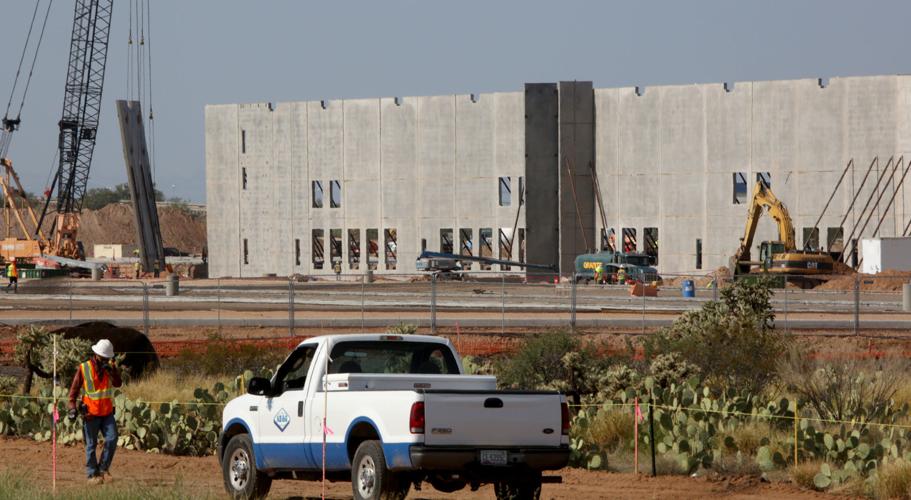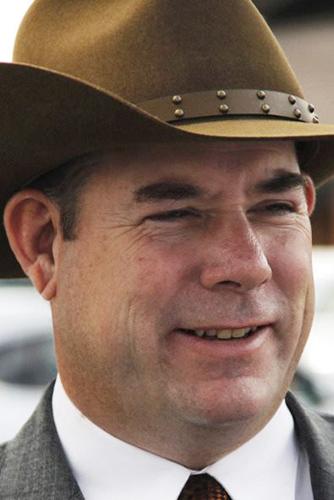I hate shopping at the malls and stores this time of year as many people do.
But you won’t find me resorting to Amazon as my convenient backup, not this year. The online behemoth has become too big and too dubious a corporate citizen for me to support anymore.
That’s true even though Amazon is offering free shipping on everything delivered before Christmas Day, and even though the company is building a huge new Tucson distribution center.
For me, the last straw was the selection of the so-called HQ2. Amazon announced in September 2017 it was planning to create a new second headquarters, additional to its Seattle headquarters.
With that announcement, a nationwide race to debasement began.
Tucson led the race momentarily with our effort to gift a real, live saguaro cactus to the Seattle headquarters. Eventually 238 cities applied to host the new site and humiliated themselves to varying degrees.
Tucson’s saguaro was a small, relatively cheap symbol (and it ended up at the Arizona-Sonora Desert Museum) compared to the massive subsidies that states and localities ended up offering Amazon. Tucson and Phoenix did not make the short list, but Atlanta became a finalist by offering about $2 billion worth of incentives, including 50 free parking spaces at the airport, an exclusive lounge there, and a state-funded training academy for Amazon workers.
This was a losing offer, remember.
The winning offers were from Arlington, Virginia and New York City, sites that had the inherent advantage of being within a short drive of two of CEO Jeff Bezos’ five mansions. In other words, the fix was probably in, as it was when Tesla held a similar competition for its battery plant in 2014 and ended up choosing Reno, Nevada.
But the possibly predetermined outcome does not mean the competition was pointless. The public competition — or “Hunger Games” as Wired Magazine termed it — is what led Virginia and New York to offer about $2 billion in incentives.
Suffice it to say there is no reason Amazon needs public subsidies of any sort. Its third-quarter profit, reported last month, was a record $2.9 billion on $56.6 billion in sales.
It increasingly dominates retail sales — about 48 percent of all e-commerce as of this year. And its free shipping offer this winter will likely allow Amazon to use its might to put smaller competitors out of business.
But just as important, Amazon doesn’t just dominate the market — increasingly it is the market. As the dominant website for e-commerce, it gets to set the terms for who wins and who loses in online sales.
In 2017, sandal-maker Birkenstock complained that people were selling counterfeit Birkenstock-style sandals on the website, under names that misspelled Birkenstock. Amazon wouldn’t do enough about it, taking advantage of the market for fakes instead. Birkenstock ended up having to pull its merchandise from Amazon altogether.
Through its Alexa virtual assistants, Amazon has also found another way of knocking competitors out of the market. It is manufacturing products such as soap that a person can order by voice using Alexa. That means the other soap-makers, and makers of other products Amazon carries, are quietly pushed out by the company’s dominance of the new, convenient technology it has produced.
Amazon also, of course, diverts retail spending that would otherwise go to local stores, as do most online retailers. While Amazon does charge state sales tax on purchases made in Arizona, it doesn’t charge local sales tax.
That means our sales-tax dependent public services inevitably suffer when shoppers shift from local storefront retailers to Amazon.
Finally, Amazon controls about one third of the world’s cloud-computing market, which makes up a disproportionate share of profits. It’s one more way the company controls not just retail sales, but the flow of information. And it is competing for massive Defense Department contracts.
In short, Amazon doesn’t need me helping it become a bigger monopoly. I’m going to support other alternatives while we still can.
Gowan will head Appropriations panel
The new leaders of the Arizona House and Senate picked the chairs of the various committees this week, and a few were from Southern Arizona.
The one that really stands out: Newly elected Sen. David Gowan, of Sierra Vista, will head the Appropriations Committee. I would say it’s wonderful that a Southern Arizona legislator is heading such an important committee, but once bitten, twice shy. Gowan did not do us proud when he was speaker of the House.
It worries me to see Gowan heading the appropriations committee, of all committees, because when he was speaker he was notorious for indulging in the perks of office, especially meals paid for by lobbyists. I worry that a man who enjoys those perks so much will be in a position to trade public policy for more perks so easily.
Newly elected senator Vince Leach, a Republican of SaddleBrooke, will be vice-chair of the committee.
The other Southern Arizona legislators in new positions of authority are Republican representatives Mark Finchem of Oro Valley, Gail Griffin of Hereford and Bret Roberts of Maricopa. Finchem will serve as chair and Griffin will serve as vice-chair of the Federal Relations Committee; Griffin will chair the Natural Resources, Energy and Water Committee; Roberts will vice-chair the County Infrastructure Committee.
Kyl on estate tax
Nobody knows how long Jon Kyl will be in the U.S. Senate, but when he took the job, he said he might leave by the end of the year.
In his potentially waning days, Kyl is resuming support for a tax cut he pursued in his earlier senatorial days. He is proposing cutting in half the estate tax, a tax on inheritances valued at $11 million or more.
The Joint Committee on Taxation has estimated that only 0.2 percent of all estates are big enough to owe any estate taxes.
Kyl’s proposal, unlikely to make much headway, would reduce the tax rate on these big estates from 40 percent to 20 percent.
“It seemed to me it was important to start the debate so people can research and talk about it,” Kyl said in an interview with The Arizona Republic.
“Even if I’m not there for a long time in the Senate, others can pick that up and go with it in the next session.”







